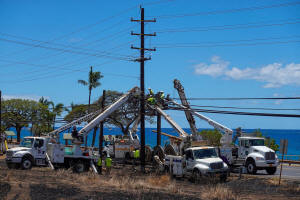Hawaiian Electric CEO's bonus lacked incentive to cut wildfire risk,
documents show
 Send a link to a friend
Send a link to a friend
 [August 26, 2023]
By Tim McLaughlin and Tom Hals [August 26, 2023]
By Tim McLaughlin and Tom Hals
(Reuters) - Hawaiian Electric’s CEO received an annual bonus last year
tied to profit, worker safety and bolstering the supply of renewable
energy, but not linked specifically to reducing wildfire risk, according
to a Reuters review of company disclosures.
The state’s largest utility is being investigated over its role in the
blaze that killed more than 114 people on the island of Maui earlier
this month, the deadliest U.S. wildfire in a century. The county of Maui
on Thursday sued Hawaiian Electric, accusing it of acting negligently by
failing to shut down electric equipment, which the county said started
the fire. Now, some investors, regulators and power industry analysts
say pay incentives should be tied to cutting risk, a strategy that could
help prevent catastrophic wildfire losses nationwide.

California utilities, which have also been blamed for deadly wildfires,
have done so, but they are alone. “It’s a principle of human nature that
people and businesses follow their incentives, so if we tie executive
pay at many levels of the organization, not just the CEO, to safety and
wildfire safety, then the organization will work harder to meet those
goals,” said consultant Alison Silverstein, a former adviser to the U.S.
Federal Energy Regulatory Commission. No cause has been identified. A
class-action lawsuit blames the Honolulu-based utility company, alleging
it failed to shut off power lines despite warnings that high winds might
blow them down and spark wildfires. The utility declined to comment for
this story. Hawaiian Electric CEO Shelee Kimura received a cash bonus in
2022 based on her performance against 10 measures including profit and
customer satisfaction. Wildfire risk mitigation was not on the list,
according to the utility’s pay disclosures. Kimura received 74%, or
$337,500, of her potential bonus award that year – her first as CEO -
because she missed seven out of 10 target goals, according to the
disclosures. Wildfire risk had been a concern for several years before
the blaze ripped through Lahaina, a historic resort town in Maui.
The Hawaii Wildfire Management Organization identified Lahaina as a
hotspot with recurring fire starts in 2018. "Dry! Windy! Hot!", the
report exclaimed in a description of Lahaina and nearby areas. U.S.
electric utilities in other tinderbox states, including Idaho, Oregon
and Washington, have also not tied compensation to the performance of
utility executives charged with developing wildfire mitigation plans,
according to a Reuters examination of their company pay disclosures.

California is the exception. Deadly conflagrations there in recent years
– including the Camp Fire blaze that killed 86 people in 2018 - have
forced investor-owned electric utilities to link wildfire mitigation
efforts to executive pay. San Diego Gas & Electric, a unit of Sempra,
pegged 20% of target bonus payouts for 2023 to wildfire mitigation and
33% to other safety measures, according to a plan that received
preliminary state approval this month.
Hard-hit PG&E has spent $39 billion over the past five years on
improvements that include wildfire mitigation; linked its CEO pay to
fire preparation; and has seen its share price soar nearly 40% in the
past year from a low suffered in wake of utility-caused fires in
California.
[to top of second column]
|

Workers repair utility lines in the fire
ravaged town of Lahaina on the island of Maui in Hawaii, U.S.,
August 15, 2023. REUTERS/Mike Blake/File Photo

“It’s tragic the lessons learned in California have not been applied
everywhere else,” said Michael Cerasoli, portfolio manager of the
TrueShares Eagle Global Renewable Energy Income Fund.
That California model, though relatively untested, should be more
broadly adopted at utilities as climate change intensifies droughts
and the frequency of severe windstorms in parts of the country,
according to eight experts and utility investors interviewed by
Reuters.
“Hawaiian Electric focused on different issues other than fire
safety and has lost almost $3 billion in market capitalization”
since the Maui fire, said Michael Underhill, chief investment
officer at Capital Innovations. “If you want certain behavior from
utility management you need to incentivize those behaviors and get
regulators to buy-in to allow a reasonable return on those
investments, which is also good corporate governance,” he said. TURN
IT OFF
To be sure, some CEOs without direct pay incentives for wildfire
management say they are working hard to prevent blazes.

In Idaho, another state buffeted by severe wildfires this year after
an intense drought, the largest electric utility also does not
explicitly link executive pay to cutting wildfire risk, according to
its latest pay disclosure with the SEC. But Idacorp Chief Financial
Officer Brian Buckham recently described wildfire mitigation efforts
as substantial: caution is the rule during the dry season, when even
the undercarriage of a utility truck can ignite crackly sage brush.
“If the conditions are what we would call risky, we won't even drive
in there with our trucks,” Buckham said at an Aug. 16 investment
conference. Idacorp declined to comment on its pay practices and how
they relate to wildfire mitigation.
Oregon’s big utility Portland General Electric Co did not return
messages seeking comment for this story.
Both states have significant fires now, according to authorities.
Larry Glazer, a co-founder of Boston’s Mayflower Advisors, whose $4
billion in managed assets include utility holdings, said U.S.
electricity systems suffer from decades of massive under investment.
The issue is much bigger than Hawaiian Electric, he said. “You don’t
want a wildfire disaster to be the catalyst for a change in public
policy,” said Glazer, who supports linking executive pay to wildfire
mitigation. “But that’s where we are.”
(Reporting By Tim McLaughlin and Tom Hals; editing by Peter
Henderson, Noeleen Walder, Rich Valdmanis and Marguerita Choy)
[© 2023 Thomson Reuters. All rights
reserved.]This material may not be published,
broadcast, rewritten or redistributed.
Thompson Reuters is solely responsible for this content.
 |